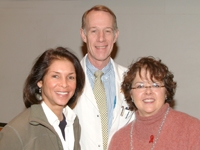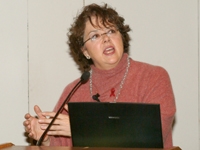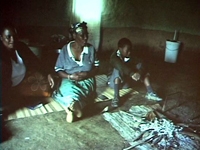
From left: Jeanne Moutoussamy-Ashe; Dr. Henry Murray, the Arthur R. Ashe, Jr. Professor of Medicine; and Laurie Garrett at the 2005 Arthur Ashe Endowment Lecture.
While impressive progress against HIV and AIDS has been made in the developed world, the epidemic continues to worsen in many developing countries, warned journalist and author Laurie Garrett at the 2005 Arthur Ashe Endowment Annual Lecture at Weill Cornell Medical College.
Speaking to a capacity audience at Uris Auditorium on Dec. 8, Garrett addressed some of the factors that have led to the spread of HIV/AIDS in developing countries: fear and stigma against individuals with the disease, unchecked sexual violence and antipathy toward women, lack of national leadership, and lack of resources and commitment from the developed world.
There are more than 42 million people living with HIV/AIDS in the world, the vast majority in sub-Saharan Africa. The disease is spreading fastest in Eastern Europe. Despite warnings from the World Health Organization and other international groups about the mounting epidemic, governments in the hardest-hit and growing areas have yet to recognize HIV/AIDS as a problem that will profoundly affect their long-term political, social, health and economic security. In the meantime, fear, superstition and social instability ensure the disease's growth.
Sexual violence is intrinsically linked to the spread of HIV/AIDS in Africa, said Garrett. In the South African province of KwaZulu-Natal, where she spent much of her time investigating, opposing political parties and militias recruited young boys from their households throughout the 1980s and 1990s. The boys, now men, were taught to maim, kill and rape their rivals all across the region. "The level of carnage of rape is almost beyond all comprehension," she said.

Children of KwaZulu-Natal, South Africa.
"All across Kwazulu-Natal, HIV is truly out of control," said Garrett. In one of the communities she visited, the prevalence of HIV in girls under 18 was 27 percent. For women 25 to 35, it was an astounding 66 percent.
According to Garrett, the predominance of rape has also been ascribed to the notion, in some circles, that by having sex with a virgin, it takes the virus away. "Every female, regardless of age, are targets," she said.
Because women and girls often have little control over the safety of their sexual encounters, the abstinence paradigm — a principal ingredient in President Bush's Emergency Plan for AIDS Relief — is of little use to them. The real issue, she said, is that until many of these countries radically change the way men view women, the epidemic will not slow down. Such a transformation will only come about through national leadership, Garrett maintained.
Weill Cornell Medical College and its chief clinical partner, NewYork-Presbyterian Hospital/Weill Cornell Medical Center, have been actively involved in the fight against HIV/AIDS. Since 1996, international health care workers from some of the hardest-hit countries afflicted by HIV have come to the Hospital to receive broad-based clinical training. By the end of 2006, the International Health Care Worker HIV Training Program at Weill Cornell will have brought more than 70 workers from countries such as Cameroon, Sudan, Uganda, India and the Dominican Republic.

Laurie Garrett delivering her lecture on "AIDS: The Lessons Not Learned, and the Perils That We Face."
While this training is vitally important, Garrett cautions that too many other health care workers will leave their home countries for jobs in the developed world, or die of HIV/AIDS themselves. There is a shortage of as many as 4 million health care workers worldwide — 1 million of them in sub-Saharan Africa.
The Global Fund to Fight AIDS, Tuberculosis and Malaria has run out of money, she warned, and the movement to combat HIV/AIDS has slowed at the crucial juncture when about 20 countries are firmly on the path with infrastructures to do mass-scale antiretroviral distribution.
Garrett calls for a total rethinking of the global health challenge. While nine nations in the world control 73 percent of the global wealth, the poorest countries, which collectively control less than 4 percent of all wealth, are not able to sustain the severe impact of HIV/AIDS and its allied diseases alone. "We have a responsibility in this picture," she said.

The orphaning situation in many parts of sub-Saharan Africa is a byproduct of the increasing morbidity and mortality of HIV/AIDS. Pictured here with her grandson, a grandmother in KwaZulu-Natal raises her eight grandchildren alone.
The creation of a far more sophisticated and centralized inventory scheme for the procurement and distribution of life-sparing drugs is critical, she said.
Garrett suggests not thinking about patent versus generic drugs, but rather focusing on volume purchasing. Individual agencies in HIV/AIDS–afflicted countries are ordering drugs on a small scale. "They are competing in entirely the wrong price scheme, and they will be competing against other small countries," she said. Pharmaceutical companies would need to know how much to manufacture and that there is a guaranteed purchase at the end of it, Garrett said. It would require a scaling up of massive proportions.
Laurie Garrett is the only writer ever to have been awarded all three of the "Big P's" of journalism: The Peabody, The Polk and The Pulitzer. She is the best-selling author of "The Coming Plague: Newly Emerging Diseases in a World Out of Balance" and "Betrayal of Trust: The Collapse of Global Public Health." Currently, she is senior fellow for global health at the Council on Foreign Relations.
The Arthur Ashe Endowment Annual Lecture is sponsored by the Arthur Ashe Endowment for the Defeat of AIDS, a program established in 1995 at the Medical College in honor of the world-renown tennis champion and humanitarian, Arthur Ashe. The lectureship was created in 1996 and is generously supported by Donald and Barbara Zucker. Lecturers are drawn from the most distinguished leaders in the field of HIV/AIDS.
Photos by Weill Cornell Art & Photo. Photos taken in South Africa courtesy of Laurie Garrett.

